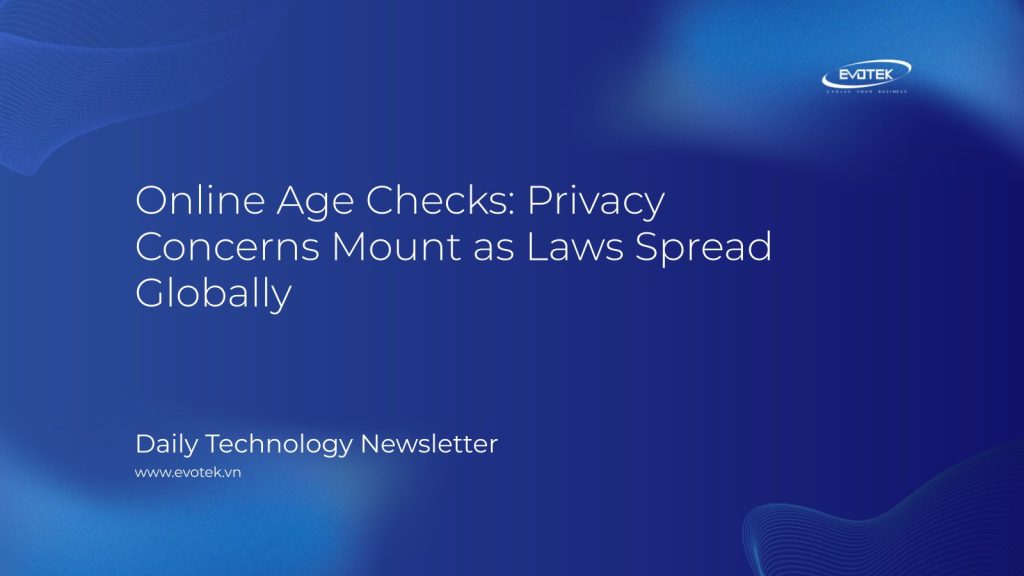A significant shift is underway in how we access online content, spearheaded by new legislative efforts worldwide. In July, the United Kingdom initiated key provisions of its Online Safety Act, a landmark law designed to enhance the safety of internet users, particularly children. A cornerstone of this legislation is “age assurance,” compelling social media platforms and search services to verify user ages. The aim is to restrict access to harmful material, including pornography, content promoting self-harm or eating disorders, and depictions of severe violence.
Implementation Challenges and User Backlash
While the fundamental concept of protecting children from inappropriate content is widely accepted, the UK’s approach to legislating a solution has faced considerable hurdles. Companies are grappling with compliance mechanisms, and users express widespread dissatisfaction with the intrusive verification processes. Despite their invasive nature, these age-verification systems frequently prove ineffective.
Ofcom, the UK’s communications regulator, outlined several acceptable age-verification methods, which include:
- Facial age estimation: Analyzing a live photo or video to assess a person’s likely age.
- Financial verification: Checking age through credit card providers, banks, or mobile phone network operators.
- Photo ID matching: Cross-referencing a passport or similar government ID with a selfie.
- Digital identity wallets: Utilizing digital credentials containing proof of age.
Real-World Failures and Unexpected Restrictions
The practical application of these systems has been fraught with issues. For instance, systems deployed by platforms like Reddit and Discord have reportedly been circumvented by simple screenshots from video games. Concurrently, there has been a significant surge in downloads of Virtual Private Networks (VPNs) in the UK, as users seek to bypass geographical restrictions and verification requirements.
Beyond the technical glitches, these new rules are imposing unexpected access limitations. Reddit has begun blocking UK users from accessing subreddits containing news and footage from regions like Gaza and Ukraine unless they provide identification. Even less explicit communities are affected; according to journalist Taylor Lorenz, British users now need to verify their age to access vital support subreddits such as r/periods, r/stopsmoking, r/stopdrinking, and r/sexualassault, which are crucial for minors and adults seeking community support.
Major platforms are scrambling to adapt. Spotify is implementing facial scanning technology, while YouTube employs AI to infer user ages, allowing override with a government ID. X (formerly Twitter), known for its diverse content including adult material, also uses age estimation, though its effectiveness and appeal process remain unclear.
Privacy Concerns and the Future of the Internet
It’s premature to assess the full long-term impact of the UK’s Online Safety Act, but its immediate implications are apparent. For determined individuals, particularly minors, bypassing these checks appears relatively easy. For the broader user base, however, the sudden demand to prove age constitutes a significant setback for online privacy.
The Electronic Frontier Foundation (EFF) has voiced strong opposition, stating:
The UK’s scramble to find an effective age verification method shows us that there isn’t one, and it’s high time for politicians to take that seriously. The Online Safety Act is a threat to the privacy of users, restricts free expression by arbitrating speech online, exposes users to algorithmic discrimination through face checks, and leaves millions of people without a personal device or form of ID excluded from accessing the internet.
While the UK’s legislation, consistent with its historical tendency towards surveillance over civil liberties, might seem an isolated incident, it mirrors a pervasive global trend. Across various nations and within the United States, an increasing number of age and identity verification laws are being enacted. The U.S. Supreme Court recently upheld a Texas age-verification law, deviating from prior precedent, and nearly half of American states, predominantly those with conservative governments, have passed similar legislation, often framed as measures to prevent access to pornography.
Many online services already incorporate some form of identity verification (e.g., credit card requirements or government ID for e-scooter rentals). However, these new laws signal the emergence of a fundamentally different internet—one where users may soon be compelled to disclose their identity before engaging in virtually any online activity.

 日本語
日本語 한국어
한국어 Tiếng Việt
Tiếng Việt 简体中文
简体中文